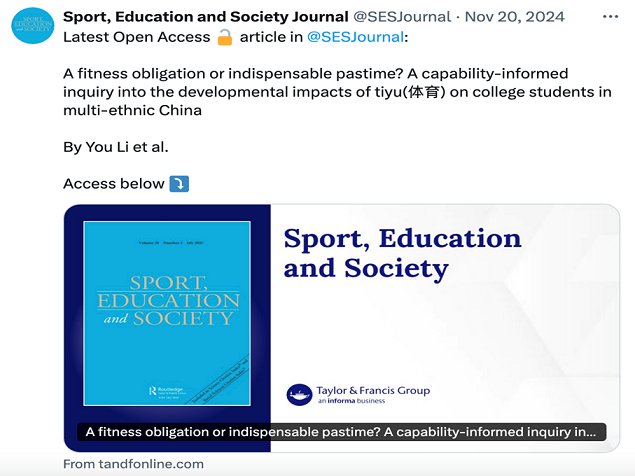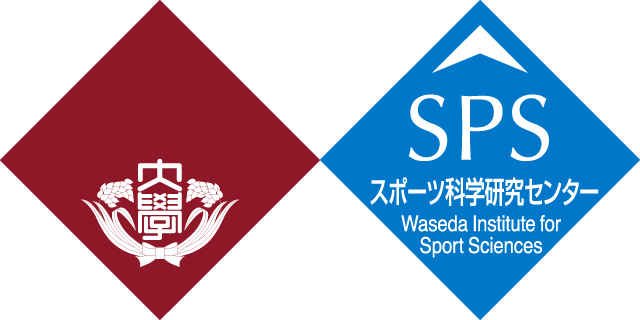- NEWS
- A fitness obligation or indispensable pastime? A capability-informed inquiry into the developmental impacts of tiyu(体育) on college students in multi-ethnic China/フィットネスの義務か、不可欠な娯楽か? 中国の多民族地域の大学生に対する「体育」の発達的影響に関する能力情報に基づく考察
A fitness obligation or indispensable pastime? A capability-informed inquiry into the developmental impacts of tiyu(体育) on college students in multi-ethnic China/フィットネスの義務か、不可欠な娯楽か? 中国の多民族地域の大学生に対する「体育」の発達的影響に関する能力情報に基づく考察

- Posted
- Wed, 22 Jan 2025
概要/Abstract
Grounded on an 18-month ethnographic fieldwork conducted in a border region of Southwestern China, this qualitative study targets a multi-ethnic college setting to examine the developmental impacts of regular sporting provisions on campus. Qualitative data were collected from multiple sources through participant observation, online survey and in-depth focus group interviews. Drawing on ‘tiyu (体育)’ and the Capabilities Approach (CA) as conceptual and theoretical references, data were analysed using reflexive thematic analysis whereby four themes with sub-themes were contextually and reflexively constructed. These themes include: (1) fundamental means and ends: tiyu is an essential functioning of health and education; (2) individual agency enables extra gains: tiyu for interpersonal affiliation, emotions and control over one’s environment; (3) from instrumental to elemental: tiyu is an indispensable capability of play; (4) developmental prospects are conditional: counter-stories of tiyu. As the findings revealed both positive and negative impacts of tiyu on participants, it furthers the understanding of sport (tiyu)’s malleable nature and indicates that, although sport (tiyu) can bring about positive developmental outcomes, these outcomes are neither universal nor guaranteed.
中国南西部の国境地帯で1年半にわたって実施された民族誌的フィールドワークに基づくこの質的研究は、多民族が集う大学の環境を対象とし、キャンパスで定期的に行われるスポーツの機会が大学生の心身の発達に及ぼす影響について検討しました。質的データは、参与観察、オンライン調査、詳細なフォーカス・グループ・インタビュー等複数の情報源から収集しました。その後、概念的・理論的参照としての「体育」と「潜在能力アプローチ(CA)」を用い、再帰的主題分析を用いてデータを分析し、4つのテーマとサブテーマを文脈的・再帰的に構築しました。これらのテーマには以下が含まれます。(1)基本的な手段と目的:健康と教育の要としての機能。 (2) 個人の主体性がもたらすさらなる利益:対人関係、感情、環境の制御にもたらす効能。(3) 道具性から原点への回帰:遊びに欠かせない潜在能力として。(4) 発達に対する留保:対抗的な事例類。結論として本研究は、「体育」が参加者にもたらす影響にはポジティブな面とネガティブな面があることを明らかにしました。そして、「体育」の可鍛的な性質に対する理解を深めることに貢献しました。すなわち、「体育」がポジティブな発達的結果をもたらす可能性がある一方で、それらの結果が普遍的なものでも保証されたものでもないことを示しました。
(1)これまでの研究で分かっていたこと/Research Background
Sport, physical education (PE) and related activities are often considered beneficial to human development at the individual, community and international levels. These assumed benefits include but are not limited to physical and mental health, educational benefits, social inclusion, gender empowerment, as well as peacebuilding. To date, this belief has exerted a lasting influence bolstering extensive engagements in focused realms, such as sport for development and peace (SDP), which primarily targets disadvantaged groups or at-risk youth, aiming to intentionally harness the transferable values of sport for positive developmental outcomes. Despite the continuously growing interest in sport’s broader potential, critical scholars have cautioned about the mythopoetic presumption of its developmental benefits, as well as the contested praxis and discourses that still largely favour neoliberal approaches undergirded by Western ideologies. Contrastingly, there has been a dearth of attention attached to non-Western contexts, particularly countries with distinct postulations regarding sport and PE, such as China.
(2)今回の研究で新たに実現しようとしたこと、明らかになったこと/Findings
Informed by tiyu(体育) and the CA, the findings suggest that tiyu in this setting was, first and foremost, perceived as an essential functioning of health and education, representing both a vital end of and means for human capabilities. Based on and beyond these two fundamental values, tiyu also enabled participants to exert their agency for broader capabilities, including interpersonal affiliation, emotions and control over one’s environment. Additionally, respondents indicated that tiyu became an indispensable pastime during the COVID-19 restriction, making it not only instrumental but also elemental for the capability of play. Nevertheless, counter-stories revealed the potential detriments and limitations of tiyu in the setting, calling for a critical and realistic understanding of its developmental impacts, and the necessity for more inclusive, diverse and tailored sporting opportunities to engage broader participants.
(3)そのために新しく開発した手法/Methods developed
Instead of uncritically applying ‘sport’ in the context of China, this study applies ‘tiyu(体育)’ as the key terminology for a better contextual and culturally-specific understanding of contemporary sporting practices in China. This contrasts with the convention in English and Chinese literature assuming an interchangeable connotation of ‘sport’ between these two languages, which is convenient but not necessarily accurate, and can be misleading. Far from a long-held Chinese concept, tiyu was originally adopted from a Wase-kango (和製漢語, namely Japanese-made Chinese words) term – ‘taīku (体育)’ – the straight translation of ‘physical education (PE)’ in Japanese. However, tiyu in Chinese has been expanded beyond its origin to become the umbrella term that mandates all relevant doings pertaining to PE and sports. For example, while tiyu still serves to denote PE-related terms, especially ‘tiyu-ke (体育课, PE Class)’, it is also extensively applied in vocabularies of sport, such as ‘tiyu-saishi (体育赛事,sport events)’ and ‘zhiye-tiyu (职业体育, professional sports)’.
(4)研究の波及効果や社会的影響/Research implications to the society
Based on the findings, this study argues that tiyu exemplifies an entity of malleable nature that could bring about varying influences on different participants in diverse contexts. This echoes critical sport scholarships that view sport as an ‘empty form’, the impacts of which are contingent on how, to whom and for what purposes it is deployed. Accordingly, our findings call for sport practitioners, researchers and policymakers to critically recognise and, therefore, reject oversimplified beliefs that continue to exaggerate sport (tiyu) as unconditionally and universally beneficial. Contrarywise, credulously embracing the fancy narratives of sport, not least of which favour elitism, ableism, and commercialism, would considerably hinder the prospects of benefiting the participants, especially those in need.
(5)今後の課題/Future issues
Our findings uphold previous studies to recognise the developmental possibilities and experiences of ordinary sport offerings and careers, such as those provided by schools. This furthered understanding regarding how long-term, non-interventional and public-funded sporting opportunities could elicit various benefits, and can be added to the effort for reconciling the prevailing model of short-term interventional projects deploying sports for developmental outcomes. To enable more inclusive, diverse, playful, and beneficial sporting experiences for more people, the connection between ordinary sporting opportunities and human development concerns warrants further attention from ensuing research, practices, and policies.
(6)研究者のコメント/Researcher’s Comment
Social science inquiries targeting sport and PE in China have been notably dominated by top-down perspectives, which tend to favour upper directives and policy discourses at the cost of neglecting the experiences of practitioners and recipients on the ground. Aiming to address this issue and empower ordinary participants, our research foregrounds bottom-up perceptions and embodied experiences of those at the grassroots level, thereby offering grounded insights on how sporting opportunities can and cannot benefit participants’ individual development. In doing so, we do not take for granted sport’s assumed values but critically reflect upon the humble potential of sport in impacting human development and capabilities. We encourage fellow researchers, policymakers, practitioners and participants to take a similarly critical stance so that current sporting practices and experiences can be genuinely improved.
(7)用語解説/Terminology
※1 Sport for Development and Peace (SDP)
Sport for Development and Peace is a global movement endorsed by the United Nations that aspires to intentionally harness sport and relevant activities for non-sporting development and peace outcomes, such as social inclusion and conflict resolution.
※2 ‘Tiyu(体育)’
‘Tiyu(体育)’ is the overarching concept of sport-related terminologies in Chinese (particularly in mainland China). It was initially borrowed from the Japanese translation of physical education – ‘taīku (体育)’, but has been expanded to encompass broader meanings, including sport, physical activities, and physical culture.
※3 Capabilities Approach
The Capability(-ies) Approach (CA) is a well-conceptualized body of theories that underscores human development and well-being in terms of capabilities as substantive freedoms to realise the valuable doings and beings, contrasting with merely resource distributions or functionings (the actual realisation of human functions). It was originally coined by the Nobel Laureate Amartya Sen to counter traditional development thinking, and was later developed by renowned academics such as Martha Nussbaum and Ingrid Robeyns.
(8)論文情報/Journal Information
雑誌名/Journal:Sport, Education and Society
論文名/Title:A fitness obligation or indispensable pastime? A capability-informed inquiry into the developmental impacts of tiyu(体育) on college students in multi-ethnic China
執筆者名・所属機関名/Authors and Affiliated Organisation:You Lia, Muhammad Sufri Ramlib, Yi Zhanga and Kohei Kawashimaa
aGraduate School of Sport Sciences, Waseda University; bNational Institute of Education, Nanyang Technological University
Publishment Date(Local Time):13 November 2024
Publishment Date(Japan Time):14 November 2024
URL:https://doi.org/10.1080/13573322.2024.2426630
DOI:10.1080/13573322.2024.2426630
